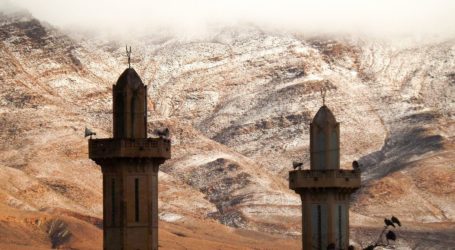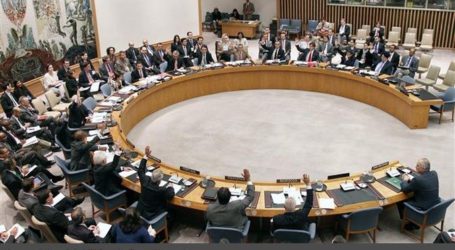SHANGHAI COOPERATION ORGANIZATION WELCOMES IRAN NUCLEAR DEAL

Tashkent, 26 Muharam 1435/30 November 2013 (MINA) – The Shanghai Cooperation Organization, a Eurasian political, economic and military organization, is pleased with the consensus between the UN Security Council permanent members plus Germany (P5+1 countries) and Iran after talks over Tehran’s nuclear program.
A compromise on Tehran’s nuclear program will improve the situation in Middle East and reinforce mutual trust between the countries concerned, Shanghai Cooperation Organization Secretary General Dmitriy Mezentsev said at a conference in Uzbekistan on Friday.
The Shanghai Five grouping was created in 1996 by the heads of the states of Kazakhstan, the People’s Republic of China, Kyrgyzstan, Russia and Tajikistan, Anadolu Agency reported as quoted by Mi’raj News Agnecy (MINA).
The five member nations first admitted Uzbekistan in the Shanghai Five mechanism, and together the states founded the Shanghai Cooperation Organization in 2001, aiming to transform it to a higher level of cooperation.
The nuke agreement requires Iran to halt or scale back parts of its nuclear infrastructure, the first such pause in more than a decade, foreseeing an initial six-month period that brings boundaries to Tehran’s nuclear program.
The main aim of the accord is to give international negotiators time to pursue a more comprehensive pact to roll back much of Iran’s nuclear program.
Tehran’s next-generation centrifuges and the Arak reactor, which could begin to produce plutonium as early as 2014, would be halted, along with new international inspections to be implemented throughout the nuclear program.
In exchange, Tehran would receive limited sanctions relief, which would add roughly $1.5 billion in revenue from suspended sanctions “on gold and precious metals, Iran’s auto sector, and Iran’s petrochemical exports”.
An additional $4.2 billion would be transferred to Iran in installments from Iranian oil sales and Iran will be allowed to transfer $400 million in tuition assistance for Iranian students to international educational institutions.
On Monday (24/11), The P5+1 world powers and Iran have struck a historic deal on Tehran’s nuclear program at talks in Geneva on Sunday. Ministers overcame the last remaining hurdles to reach agreement, despite strong pressure from Israel and lobby groups.
Under the interim agreement, Tehran will be allowed access to $4.2 billion in funds frozen as part of the financial sanctions imposed on Iran over suspicions that its nuclear program is aimed at producing an atomic bomb.
Iran’s foreign minister, Javad Zarif, called the deal a “major success” and said Tehran would expand its cooperation with the International Atomic Energy Agency (IAEA).
While Iranian President Hassan Rouhani announced that the deal reached in Geneva shows that world powers have recognized Tehran’s “nuclear rights.”
“Constructive engagement [and] tireless efforts by negotiating teams are to open new horizons,” Rouhani said on Twitter shortly after the announcement.
In turn, the IAEA said it is ready to check that Iran keeps its commitments under the deal.
“With the agreement of the IAEA’s Board of Governors, the Agency will be ready to fulfill its role in verifying the implementation of nuclear related measures,” said Director General Yukiya Amano as cited by Reuters.
Foreign ministers from the US, Russia, UK, France, China, Germany and the EU hailed the deal as a step toward a “comprehensive solution” to the nuclear standoff between Tehran and the West. The interim deal was reached early Sunday morning in Geneva after some 18 hours of negotiation.
“While today’s announcement is just a first step, it achieves a great deal,” US President Barack Obama said in a statement at the White House. “For the first time in nearly a decade, we have halted the progress of the Iranian nuclear program, and key parts of the program will be rolled back.”
However, Obama said that if Iran fails to keep to its commitments over the next six months, the US will “ratchet up” sanctions. US Secretary of State John Kerry, a key participant in the Geneva talks, said that Iran still had to prove it is not seeking to develop atomic weapons.
Tehran has repeatedly denied that it is developing atomic weapons, however, and maintains that its nuclear program is purely for civilian purposes.
Uranium enrichment
As part of the agreement, the international community has accepted Tehran’s right to a peaceful nuclear program. But after the deal was struck, participants in the Geneva talks put different interpretations on the issue of Iran’s right to enrich uranium.
Iran’s Deputy Foreign Minister Seyed Abbas Araghchi wrote on Twitter that the right to enrichment had been recognized in negotiations, and after the deal was clinched Russian Foreign Minister Sergey Lavrov said the deal accepted Tehran’s right to enrich uranium.
“This deal means that we agree with the need to recognize Iran’s right for peaceful nuclear energy, including the right for enrichment, with an understanding that those questions about the [Iranian nuclear program] that still remain, and the program itself, will be placed under the strictest IAEA control,” Lavrov told journalists.
John Kerry had a different spin on the deal, however, telling the media that it did not recognize Tehran’s right to enrich nuclear fuel.
“The first step, let me be clear, does not say that Iran has a right to enrich uranium,” Kerry said.
Israel has already voiced its opposition to the deal with Iran, claiming it is based on “Iranian deception and self-delusion.” Prime Minister Benjamin Netanyahu condemned the agreement as a “historic mistake” and said the world had become a more dangerous place. (T/P04/E1)
Mi’raj News Agnecy (MINA)






